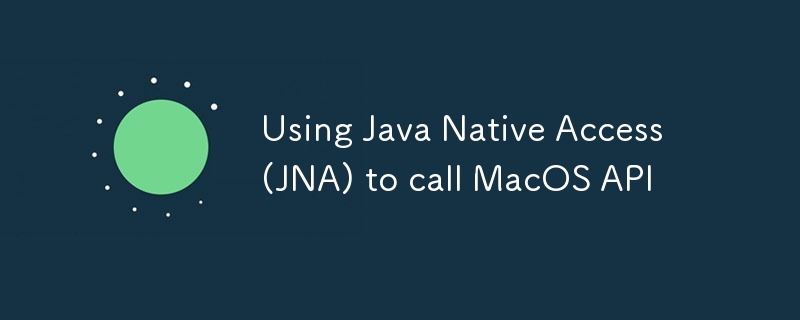Java Native Access (JNA) を使用して MacOS API を呼び出す
2024 年 11 月 9 日に公開

導入
これは、MacOS API で JNA を使用する方法に関する簡単な例です。私はまだ学習中なので、これについては説明しませんが、理解を容易にし、他の目的で実行する方法についての基本的なアイデアを得るために、コードを最小限に抑えています。
コードの大部分は Intellij-Community (Apache ライセンス) からのものです。
依存
必要なのは jna-platform だけです。
net.java.dev.jna jna-platform 5.13.0
コード
ソースコードファイルは全部で4つあります。 ID は IntelliJ から変更せずにコピーされます。 MyFoundation と MyFoundationLibrary は、それぞれ Foundation と FoundationLibrary からトリミングされます。
アプリケーション.java
package org.example;
import com.sun.jna.Pointer;
import static org.example.MyFoundation.*;
public class Application {
public static void main(String[] args) throws Exception {
ID processInfoCls = getObjcClass("NSProcessInfo");
Pointer processInfoSel = createSelector("processInfo");
Pointer processNameSel = createSelector("processName");
ID processInfo = invoke(processInfoCls, processInfoSel);
ID processNameNSString = invoke(processInfo, processNameSel);
String processName = toStringViaUTF8(processNameNSString);
System.out.println(processName);
}
}
ID.java
package org.example;
import com.sun.jna.NativeLong;
public final class ID extends NativeLong {
public ID() {
}
public ID(long peer) {
super(peer);
}
public static final ID NIL = new ID(0L);
public boolean booleanValue() {
return intValue() != 0;
}
}
MyFoundationLibrary.java
public interface MyFoundationLibrary extends Library {
int kCFStringEncodingUTF8 = 0x08000100;
ID objc_getClass(String className);
Pointer sel_registerName(String selectorName);
int CFStringGetLength(ID theString);
byte CFStringGetCString(ID theString, byte[] buffer, int bufferSize, int encoding);
}
MyFoundation.java
package org.example;
import com.sun.jna.*;
import java.lang.reflect.Proxy;
import java.util.Collections;
public class MyFoundation {
private static final MyFoundationLibrary myFoundationLibrary;
private static final Function myObjcMsgSend;
static {
myFoundationLibrary = Native.load("Foundation", MyFoundationLibrary.class, Collections.singletonMap("jna.encoding", "UTF8"));
NativeLibrary nativeLibrary = ((Library.Handler) Proxy.getInvocationHandler(myFoundationLibrary)).getNativeLibrary();
myObjcMsgSend = nativeLibrary.getFunction("objc_msgSend");
}
public static ID getObjcClass(String className) {
return myFoundationLibrary.objc_getClass(className);
}
public static Pointer createSelector(String s) {
return myFoundationLibrary.sel_registerName(s);
}
private static Object [] prepInvoke(ID id, Pointer selector, Object[] args) {
Object[] invokArgs = new Object[args.length 2];
invokArgs[0] = id;
invokArgs[1] = selector;
System.arraycopy(args, 0, invokArgs, 2, args.length);
return invokArgs;
}
public static ID invoke(final ID id, final Pointer selector, Object... args) {
// objc_msgSend is called with the calling convention of the target method
// on x86_64 this does not make a difference, but arm64 uses a different calling convention for varargs
// it is therefore important to not call objc_msgSend as a vararg function
return new ID(myObjcMsgSend.invokeLong(prepInvoke(id, selector, args)));
}
public static String toStringViaUTF8(ID cfString) {
if (ID.NIL.equals(cfString)) return null;
int lengthInChars = myFoundationLibrary.CFStringGetLength(cfString);
int potentialLengthInBytes = 3 * lengthInChars 1; // UTF8 fully escaped 16 bit chars, plus nul
byte[] buffer = new byte[potentialLengthInBytes];
byte ok = myFoundationLibrary.CFStringGetCString(cfString, buffer, buffer.length, MyFoundationLibrary.kCFStringEncodingUTF8);
if (ok == 0) throw new RuntimeException("Could not convert string");
return Native.toString(buffer);
}
}
リリースステートメント
この記事は次の場所に転載されています: https://dev.to/franzwong/using-java-native-access-jna-to-call-macos-api-2pi0?1 侵害がある場合は、[email protected] までご連絡ください。それを削除するには
最新のチュートリアル
もっと>
-
 socket.ioを使用したチャットアプリケーションこの記事では、socket.ioとbackbone.jsを使用した簡単なチャットアプリケーションの構築を示しています。 socket.ioはリアルタイムのインタラクティブなWebアプリケーションを容易にしますが、Backbone.jsは、より良い管理とデカップリングのためにクライアント側のコードを...プログラミング 2025-03-22に投稿されました
socket.ioを使用したチャットアプリケーションこの記事では、socket.ioとbackbone.jsを使用した簡単なチャットアプリケーションの構築を示しています。 socket.ioはリアルタイムのインタラクティブなWebアプリケーションを容易にしますが、Backbone.jsは、より良い管理とデカップリングのためにクライアント側のコードを...プログラミング 2025-03-22に投稿されました -
 メソッドチェーンは、jQueryコードをより簡潔で効率的にするにはどうすればよいですか?オブジェクトまたはメソッドチェーンがjQueryコード をどのように単純化するか、他のJavaScriptフレームワークと比較して、JQueryの重要な利点の1つであり、そのオブジェクトまたはメソッドチェーン機能です。チェーンがどのように機能するかを理解するために、単純化された例を掘り下げまし...プログラミング 2025-03-22に投稿されました
メソッドチェーンは、jQueryコードをより簡潔で効率的にするにはどうすればよいですか?オブジェクトまたはメソッドチェーンがjQueryコード をどのように単純化するか、他のJavaScriptフレームワークと比較して、JQueryの重要な利点の1つであり、そのオブジェクトまたはメソッドチェーン機能です。チェーンがどのように機能するかを理解するために、単純化された例を掘り下げまし...プログラミング 2025-03-22に投稿されました -
 GoのVector3 structでメソッドが呼び出すときにエラーを回避する方法は?vector3メソッドコールでのポインターの管理 vector3 structのメソッド呼び出しをチェーンしようとしている間、値のアドレスを取得し、ポインターメソッドの呼び出しに関連するエラーに遭遇する場合があります。この記事では、これらのエラーを検討し、それらに対処する方法についてガ...プログラミング 2025-03-22に投稿されました
GoのVector3 structでメソッドが呼び出すときにエラーを回避する方法は?vector3メソッドコールでのポインターの管理 vector3 structのメソッド呼び出しをチェーンしようとしている間、値のアドレスを取得し、ポインターメソッドの呼び出しに関連するエラーに遭遇する場合があります。この記事では、これらのエラーを検討し、それらに対処する方法についてガ...プログラミング 2025-03-22に投稿されました -
 あなたはjavascriptの約束を強制することができますか?は、javascriptプログラミングの領域で約束をキャンセルすることは可能ですか?ただし、疑問がしばしば発生します。 ES6約束を強制することは可能ですか?これは、約束をキャンセルすることには、健全なキャンセルセマンティクスを保証する複雑な設計上の考慮事項が含まれるためです。言語仕様は、...プログラミング 2025-03-22に投稿されました
あなたはjavascriptの約束を強制することができますか?は、javascriptプログラミングの領域で約束をキャンセルすることは可能ですか?ただし、疑問がしばしば発生します。 ES6約束を強制することは可能ですか?これは、約束をキャンセルすることには、健全なキャンセルセマンティクスを保証する複雑な設計上の考慮事項が含まれるためです。言語仕様は、...プログラミング 2025-03-22に投稿されました -
 \ "while(1)vs。for(;;):コンパイラの最適化はパフォーマンスの違いを排除しますか?\"while(1)vs。for(;;):速度の違いはありますか? loops? 回答: では、ほとんどの最新のコンパイラでは、(1)と(;;)。コンパイラー: perl: の両方が(1)と(;;)が同じオプコードをもたらします。 1 入力 - > 2を入力します 2 NextSt...プログラミング 2025-03-22に投稿されました
\ "while(1)vs。for(;;):コンパイラの最適化はパフォーマンスの違いを排除しますか?\"while(1)vs。for(;;):速度の違いはありますか? loops? 回答: では、ほとんどの最新のコンパイラでは、(1)と(;;)。コンパイラー: perl: の両方が(1)と(;;)が同じオプコードをもたらします。 1 入力 - > 2を入力します 2 NextSt...プログラミング 2025-03-22に投稿されました -
 フィールド関数を使用して()句の順序でmysqlの結果を注文する方法は?フィールド関数を使用して、in()order フィールド関数は、フィールド名と値のリストの2つのパラメーターを取ります。フィールド値に一致するリストの最初の値のインデックスを返します。たとえば、次のクエリは、値が3、2、または1の行の列「ID」の値1、2、3を返します: SELECT...プログラミング 2025-03-22に投稿されました
フィールド関数を使用して()句の順序でmysqlの結果を注文する方法は?フィールド関数を使用して、in()order フィールド関数は、フィールド名と値のリストの2つのパラメーターを取ります。フィールド値に一致するリストの最初の値のインデックスを返します。たとえば、次のクエリは、値が3、2、または1の行の列「ID」の値1、2、3を返します: SELECT...プログラミング 2025-03-22に投稿されました -
 Bootstrap 4 Divをモバイルに積み重ねて、デスクトップで並べて配置する方法は?divをブートストラップ4で再配置する:モバイルに積み重ねられ、デスクトップ solution: flexboxを無効にします。これを防ぐために、 < div> <div> を使用して、幅よりも大きい幅をFlexBoxを無効にします。 (a)。...プログラミング 2025-03-22に投稿されました
Bootstrap 4 Divをモバイルに積み重ねて、デスクトップで並べて配置する方法は?divをブートストラップ4で再配置する:モバイルに積み重ねられ、デスクトップ solution: flexboxを無効にします。これを防ぐために、 < div> <div> を使用して、幅よりも大きい幅をFlexBoxを無効にします。 (a)。...プログラミング 2025-03-22に投稿されました -
 プログラムを終了する前に、C ++のヒープ割り当てを明示的に削除する必要がありますか?プログラム出口にもかかわらず、Cでの明示的な削除 次の例を考慮してください。 a* a = new a(); a-> dosomething(); a; 0を返します。 } この例では、「削除」ステートメントは、「a」ポインターに割り当てられたヒープメモ...プログラミング 2025-03-22に投稿されました
プログラムを終了する前に、C ++のヒープ割り当てを明示的に削除する必要がありますか?プログラム出口にもかかわらず、Cでの明示的な削除 次の例を考慮してください。 a* a = new a(); a-> dosomething(); a; 0を返します。 } この例では、「削除」ステートメントは、「a」ポインターに割り当てられたヒープメモ...プログラミング 2025-03-22に投稿されました -
 Python 3.5のAsyncio:いつ使用するのか、いつ回避するのですか?asyncio in python 3.5:Python 3.5でAsyncioを使用する場合、いつ使用するかを避けるためにいつ使用するかを避けるために、いつ使用するか、&& await ネットワーク上でリクエストを送信する:result = await send_request(d...プログラミング 2025-03-22に投稿されました
Python 3.5のAsyncio:いつ使用するのか、いつ回避するのですか?asyncio in python 3.5:Python 3.5でAsyncioを使用する場合、いつ使用するかを避けるためにいつ使用するかを避けるために、いつ使用するか、&& await ネットワーク上でリクエストを送信する:result = await send_request(d...プログラミング 2025-03-22に投稿されました -
 JavaScriptをCSSに置き換えることができるものがいくつかありますここにJavaScriptをCSSに置き換えることができる20の事柄があります。 アニメーションハンバーガーメニュー:CSSを使用してください:チェックされて遷移して、メニューの開閉をアニメーション化します。 tooltip :use:hover and :: after for for...プログラミング 2025-03-22に投稿されました
JavaScriptをCSSに置き換えることができるものがいくつかありますここにJavaScriptをCSSに置き換えることができる20の事柄があります。 アニメーションハンバーガーメニュー:CSSを使用してください:チェックされて遷移して、メニューの開閉をアニメーション化します。 tooltip :use:hover and :: after for for...プログラミング 2025-03-22に投稿されました -
 オブジェクトがPythonに特定の属性を持っているかどうかを確認する方法は?メソッドオブジェクト属性の存在を決定するメソッド この問い合わせは、オブジェクト内の特定の属性の存在を検証する方法を求めています。未定義のプロパティにアクセスしようとする試みがエラーを提起する次の例を考えてみましょう: >>> a = SomeClass() >&g...プログラミング 2025-03-22に投稿されました
オブジェクトがPythonに特定の属性を持っているかどうかを確認する方法は?メソッドオブジェクト属性の存在を決定するメソッド この問い合わせは、オブジェクト内の特定の属性の存在を検証する方法を求めています。未定義のプロパティにアクセスしようとする試みがエラーを提起する次の例を考えてみましょう: >>> a = SomeClass() >&g...プログラミング 2025-03-22に投稿されました -
 C ++ 14の `Decltype(auto)`を単純な返品タイプの控除を超えて使用するにはどうすればよいですか?dectype(auto)を超えたdectype(auto)dectipy decuntion c 14's Decltype(auto)の汎用アプリケーションは、型控除シナリオに大きな柔軟性を提供します。最もよく知られているユースケースには、機能リターンタイプの控除を簡素化する...プログラミング 2025-03-22に投稿されました
C ++ 14の `Decltype(auto)`を単純な返品タイプの控除を超えて使用するにはどうすればよいですか?dectype(auto)を超えたdectype(auto)dectipy decuntion c 14's Decltype(auto)の汎用アプリケーションは、型控除シナリオに大きな柔軟性を提供します。最もよく知られているユースケースには、機能リターンタイプの控除を簡素化する...プログラミング 2025-03-22に投稿されました -
 無効なCSSプロパティのJavaScriptアクセス値はありますか?は、無効なCSSプロパティ値を取得できますか?ただし、JavaScriptがブラウザによって無効であるか認識されていない場合、これらのカスタムプロパティの値にアクセスできますか? 「-my-foo」などの無効なプロパティ名に遭遇した場合、このオブジェクトは通常、プロパティをスキップして他の有...プログラミング 2025-03-22に投稿されました
無効なCSSプロパティのJavaScriptアクセス値はありますか?は、無効なCSSプロパティ値を取得できますか?ただし、JavaScriptがブラウザによって無効であるか認識されていない場合、これらのカスタムプロパティの値にアクセスできますか? 「-my-foo」などの無効なプロパティ名に遭遇した場合、このオブジェクトは通常、プロパティをスキップして他の有...プログラミング 2025-03-22に投稿されました -
 FlexBoxと垂直スクロールをフルハイトレイアウトで効果的に組み合わせるにはどうすればよいですか?FlexBoxと垂直スクロールをフルハイトレイアウトに統合する フルハイトアプリケーションを操作する場合、FlexBoxと垂直スクロールバーを組み合わせた場合、一般的な要件になります。ただし、フレックスボックスレイアウトのインタラクティブな性質により、課題を引き起こす可能性があります。こ...プログラミング 2025-03-22に投稿されました
FlexBoxと垂直スクロールをフルハイトレイアウトで効果的に組み合わせるにはどうすればよいですか?FlexBoxと垂直スクロールをフルハイトレイアウトに統合する フルハイトアプリケーションを操作する場合、FlexBoxと垂直スクロールバーを組み合わせた場合、一般的な要件になります。ただし、フレックスボックスレイアウトのインタラクティブな性質により、課題を引き起こす可能性があります。こ...プログラミング 2025-03-22に投稿されました -
 Python 3.4.0をMySQLデータベースに接続する方法は?Python 3.4.0をmysqlデータベースに接続します Python 3.4.0には、mysqlデータベースに接続するための人気のmysqldbドライバーのサポートがありません。これは、MySQL統合を必要とするプロジェクトに課題をもたらす可能性があります。幸いなことに、利用可能...プログラミング 2025-03-22に投稿されました
Python 3.4.0をMySQLデータベースに接続する方法は?Python 3.4.0をmysqlデータベースに接続します Python 3.4.0には、mysqlデータベースに接続するための人気のmysqldbドライバーのサポートがありません。これは、MySQL統合を必要とするプロジェクトに課題をもたらす可能性があります。幸いなことに、利用可能...プログラミング 2025-03-22に投稿されました
中国語を勉強する
- 1 「歩く」は中国語で何と言いますか? 走路 中国語の発音、走路 中国語学習
- 2 「飛行機に乗る」は中国語で何と言いますか? 坐飞机 中国語の発音、坐飞机 中国語学習
- 3 「電車に乗る」は中国語で何と言いますか? 坐火车 中国語の発音、坐火车 中国語学習
- 4 「バスに乗る」は中国語で何と言いますか? 坐车 中国語の発音、坐车 中国語学習
- 5 中国語でドライブは何と言うでしょう? 开车 中国語の発音、开车 中国語学習
- 6 水泳は中国語で何と言うでしょう? 游泳 中国語の発音、游泳 中国語学習
- 7 中国語で自転車に乗るってなんて言うの? 骑自行车 中国語の発音、骑自行车 中国語学習
- 8 中国語で挨拶はなんて言うの? 你好中国語の発音、你好中国語学習
- 9 中国語でありがとうってなんて言うの? 谢谢中国語の発音、谢谢中国語学習
- 10 How to say goodbye in Chinese? 再见Chinese pronunciation, 再见Chinese learning

























